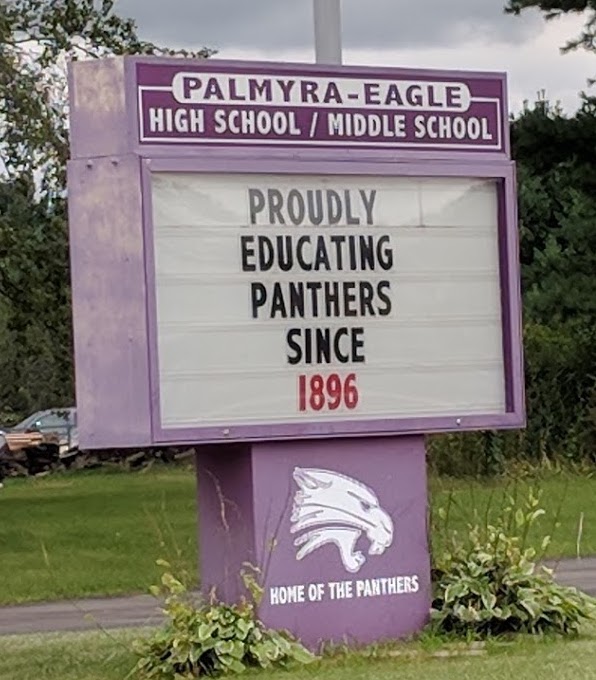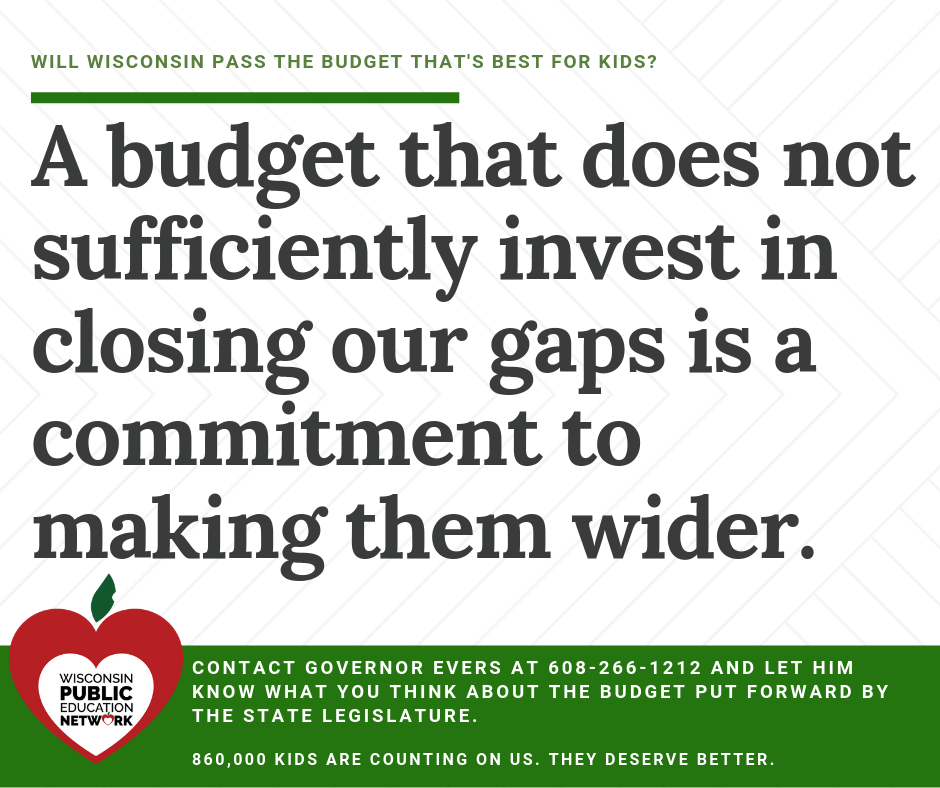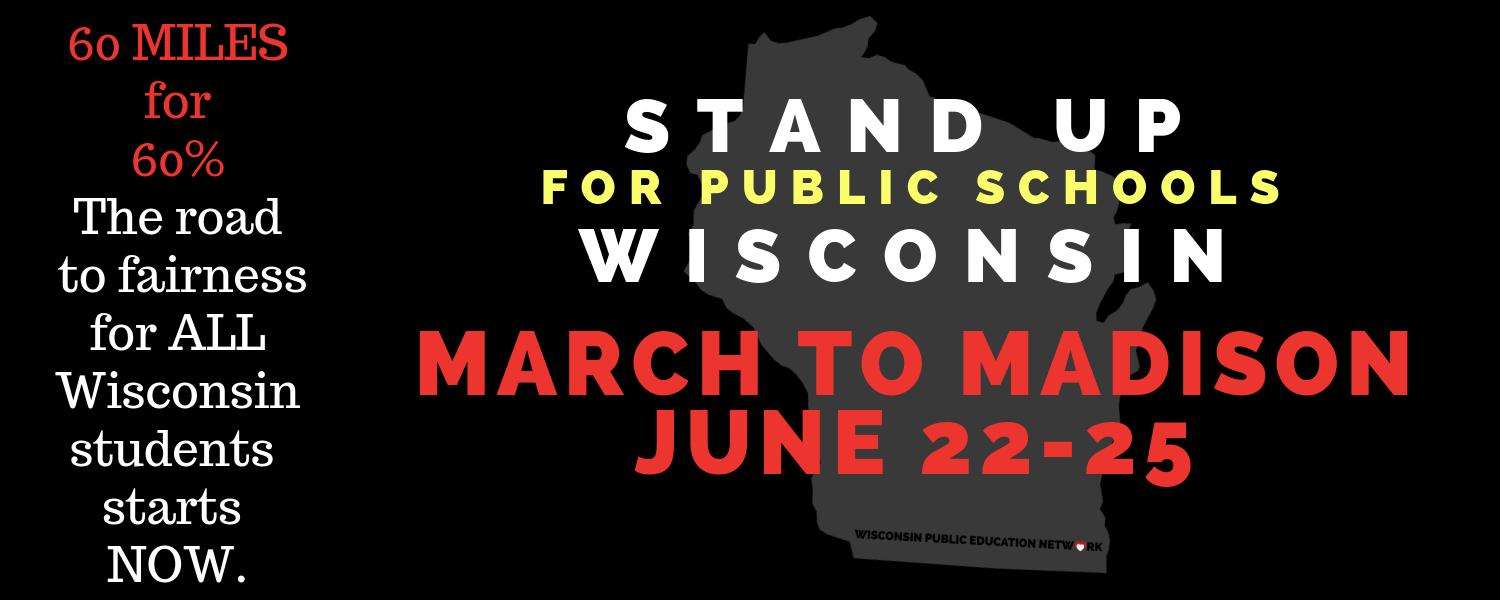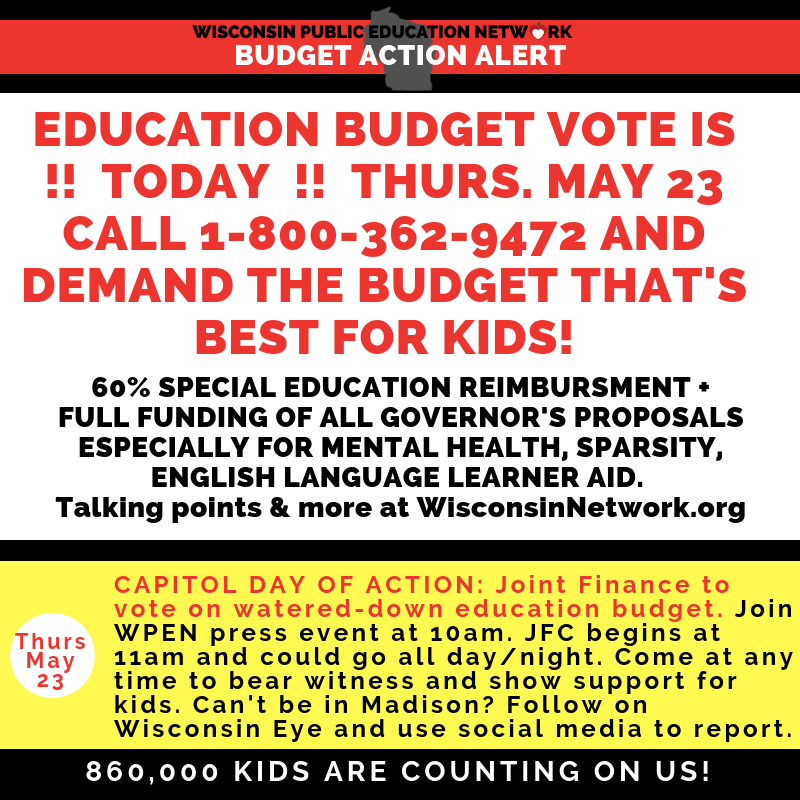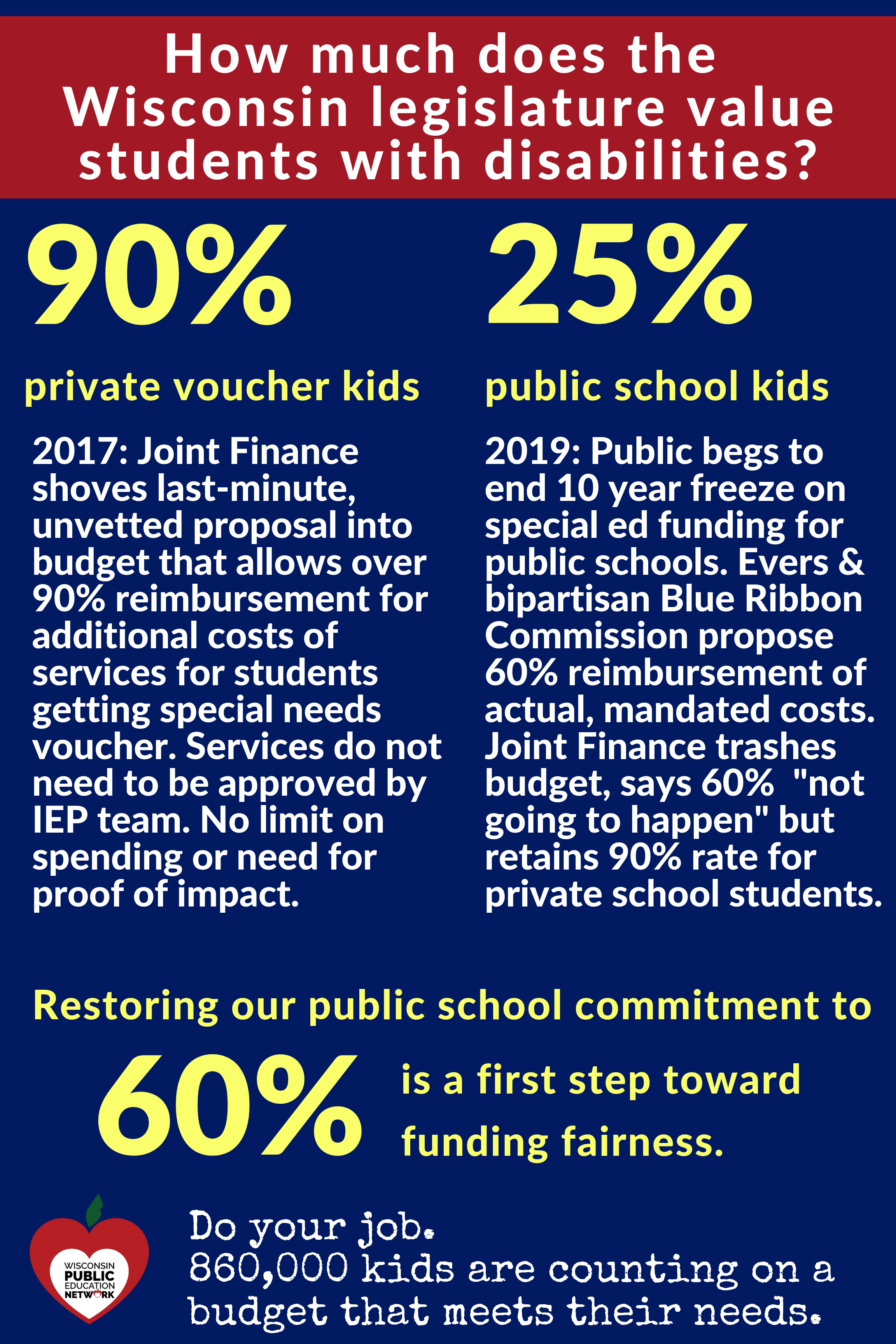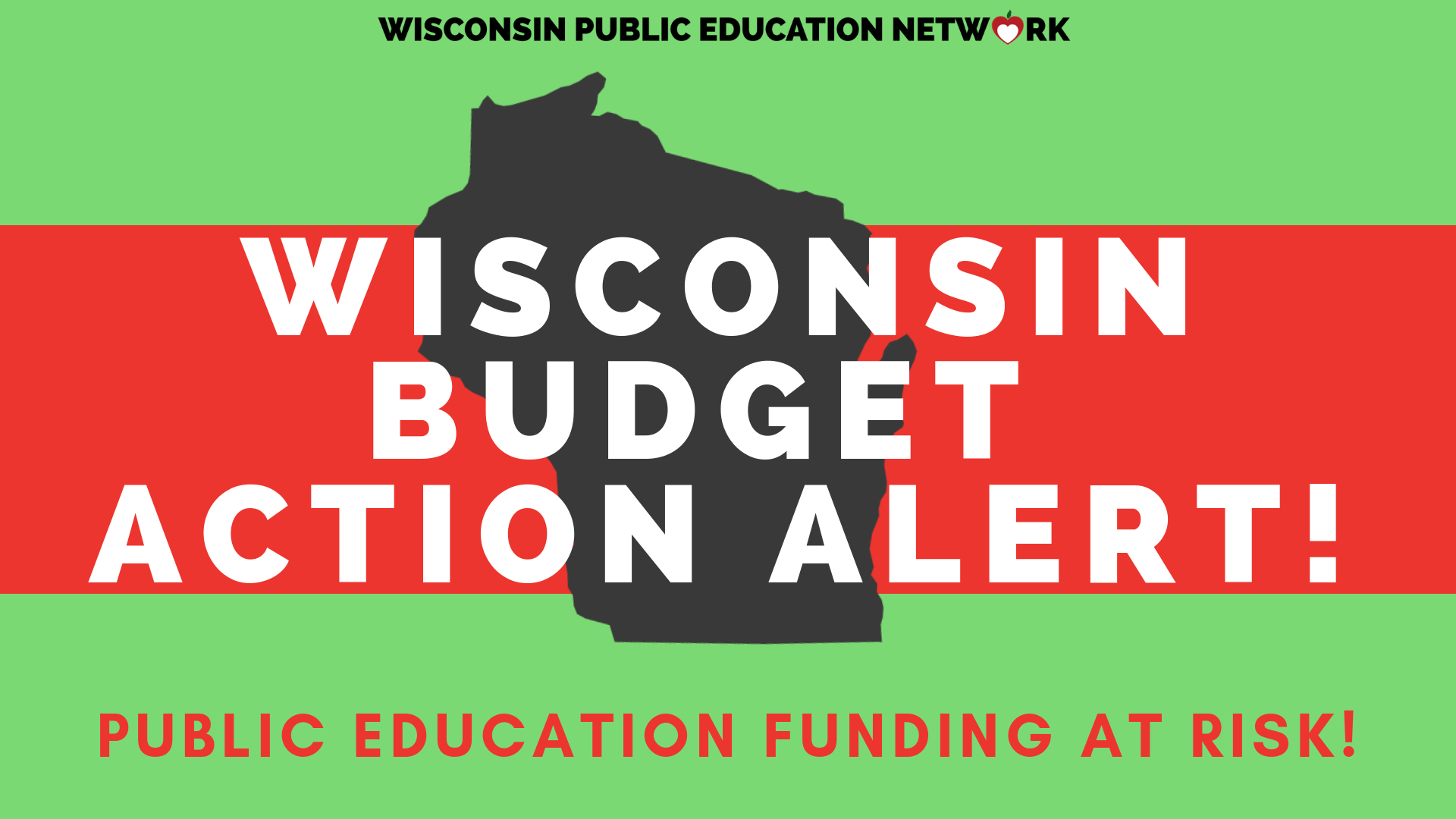Wisconsin Public Education Network
Voter Resource:
2017 Superintendent of Public Instruction Questionnaire
April 4 Election Edition!
Updated! Tony Evers and Lowell Holtz advanced through the primary to the Spring Election, which will be held on April 4. Polls are open statewide from 7am to 8pm.
Note: Our original post included responses from the four primary candidates. After the primary, both Dr. Evers and Dr. Holtz were advised that we would be republishing their responses prior to the election, and offered opportunity to submit or edit responses. Dr. Holtz did not respond to our communications before or after the primary.
Your ballot may have many more races – including school board and referenda around the state! For voter information, sample ballots, and more, visit MyVote.WI.gov.
The Wisconsin Constitution provides for public control of its highest public education office through election of a state Superintendent of Public Instruction every four years. This questionnaire was developed by a representative group of public education advocates from around the state, and by members of the Wisconsin Alliance for Excellent Schools board of directors. The candidates’ responses are published in entirety in this guide. All four candidates Superintendent of Public Instruction were asked to list their current position and qualifications/experience, and to respond in 250 words or less to the following six questions:
- What do you believe is the role of the State Superintendent in relation to public education in Wisconsin?
- In your view, what is the most pressing issue facing public education in Wisconsin, and how would you address it if elected?
- What changes in school funding will you promote in order to direct resources to districts, schools, and students based on their unique needs, such as geographical location (particularly urban and rural communities), poverty, English language learners and students with disabilities or mental health issues? If you would prioritize funding or resources in one or more of these areas, explain why.
- What is your position on publicly-funded private school vouchers (including statewide expansion and special needs vouchers) and privately operated (non-instrumentality) charter schools?
- How do you propose addressing Wisconsin’s teacher shortage?
- Identify and explain one principled stand you would be willing to take, if elected, that you suspect might cost you some popularity points.
We encourage all who care about the future of our public schools to review the responses and vote on February 21 (primary) and April 4 (spring election). Many school districts around the state also have school referenda and school board elections on the ballot. Voting on these measures is an important part of our responsibility as citizens and in doing our part to preserve and participate in local control. We invite you to stay informed and share this guide and other voter resources with your community.
Wisconsin Public Education Network is a coalition of supporters of Wisconsin students and the public schools at the heart of our communities. Wisconsin Public Education Network is a project of the Wisconsin Alliance for Excellent Schools, a 501(c)(4) non-profit organization. For more information, visit http://WisconsinNetwork.org.
ABOUT THE CANDIDATES
Tony Evers (incumbent)
Current position: State Superintendent of Public Instruction Qualifications/Experience: I’ve been an educator all my adult life. I grew up in small town Plymouth, WI. Worked at a canning factory in high school, put myself through college, and married my kindergarten sweetheart, Kathy – also a teacher.
I taught and became a principal in Tomah, was the superintendent in Oakfield and Verona, led CESA 6, served as Deputy State Superintendent and have twice been elected State Superintendent. I’ve been an educator all across Wisconsin, and no matter where I worked, I put kids first. Always.
Contact: Tony Evers for State Superintendent, PO Box 1879, Madison, WI 53701 www.tonyforwisconsin.com
Lowell Holtz
Did not respond
What do you believe is the role of the State Superintendent in relation to public education in Wisconsin?
Tony Evers: The folks who wrote our state’s constitution in 1848 spent a great deal of time discussing the role of the State Superintendent. The positions taken by our past leaders were varied and strongly-held. But in the end, they agreed that the state superintendent should be independent and elected by state voters just like other constitutional officers. They believed that public education was so important to the well-being of Wisconsin citizens that the position deserved this distinction.
Reading about these 1848 discussions humbles me. Along with my colleagues at the department, we do our best every day to live up to the high expectation to provide “general supervision” as articulated in the constitution. When my Cabinet meets with the recently-hired, highly talented employees new to the department, I am further humbled by the passion, energy and talents of those who are called to serve at the Department of Public Instruction. I always talk about our work, whether it is in school nutrition, school finance, educator licensing or any other of our many duties, as being on the “side of the angels”. I believe that I (along with my great staff) am the chief advocate for the 860,000 kids that attend our public schools. It is an honor to serve in this role and to do the hard work that this entails; forging partnerships, finding places of agreement, and generally assisting anyone with a stake in our children’s educational experience to make the greatest positive impact for kids.
Lowell Holtz: Did not respond.
In your view, what is the most pressing issue facing public education in Wisconsin, and how would you address it if elected?
Tony Evers: The citizens of the state believe the school funding system is broken. There is not equality of opportunities and there is not equity of distribution of resources. Growing numbers of kids identified by the Supreme Court continue to struggle in our schools, due in large part to the state’s reluctance to support these kids financially. If we believe in equality in outcomes, we must believe in the equitable distribution of resources.
My current state budget request restates our Fair Funding proposal. Under my proposal, all students will receive a minimum amount of aid. To provide an extra lift for some students, the general aid formula will weight students living in poverty. Additionally, the per-pupil categorical aid will be weighted to account for foster kids, English learners and students that come from impoverished families. Furthermore, changes to the summer school aid formula will incentivize all schools, but especially those districts that have students who need extra time to achieve at higher levels to engage in fun, summer learning activities. While funding isn’t the silver bullet solution to all, when I travel the state, regardless of whether a district is growing a STEM program, consolidating with a neighboring district, or just trying to attract some excellent educators and paraprofessionals, all paths do tend to lead back to resources, and the state needs to hold up its end of that bargain.
Lowell Holtz: Did not respond.
What changes in school funding will you promote in order to direct resources to districts, schools, and students based on their unique needs, such as geographical location (particularly urban and rural communities), poverty, English language learners and students with disabilities or mental health issues? If you would prioritize funding or resources in one or more of these areas, explain why.
Tony Evers: My current state budget request restates our Fair Funding proposal. Under my proposal, all students will receive a minimum amount of aid. To provide an extra lift for some students, the per-pupil categorical aid will be weighted to account for foster kids, English learners and students that come from impoverished families.
In addition to my Fair Funding plan, my budget for rural schools:
● Fully-funds the sparsity categorical aid and expands it to more rural schools;
● Expands the high cost transportation programs; and
● Provides funds for rural educator recruitment and retention.
I have championed several initiatives to support large, urban school districts, including expanding access to:
● Small class sizes and classroom support staff to help teachers effectively manage behavioral issues;
● Restorative justice and harm reduction strategies that reduce the disproportionate impact of discipline on student of color;
● Community schools, wrap around services and out-of-school time programs because schools are the center of our communities;
● Culturally-responsive curriculum and professional development that helps educators meet the needs of diverse students.
I have also worked tirelessly to develop meaningful recommendations to improve the mental health of our students. These proposals include additional funding for school social workers, money for community and school mental health grants, and resources to support mental health training for school personnel and community members. Furthermore, we are seeking to provide increased Medicaid funding for youth treatment of mental issues. An estimated one in five children need these services.
Lowell Holtz: Did not respond.
What is your position on publicly-funded private school vouchers (including statewide expansion and special needs vouchers) and privately operated (non-instrumentality) charter schools?
Tony Evers: The majorities in Washington and Madison have spent years expanding taxpayer subsidies to private schools, including special needs programs in these schools. The result: historic cuts to education followed a slow trickle of financial support for public schools amidst the statewide expansion of vouchers. A recent Fiscal Bureau reports indicate that over 200 districts (almost half) would have received more state aid without the changes in voucher funding that shifted cost to local districts.
When we move past the ideological battles, we’re left with tough choices about priorities and responsibilities. Bottom line: we have a constitutional obligation to provide an education for every kid in this state, from Winter to West Salem.
That said, we all know the current majorities and proposed U.S Education Secretary support voucher expansion, so here are some key principles for moving forward:
- The state should adequately fund our public school system before expanding vouchers;
- The state, rather than local school districts, should pay the full cost of the voucher program;
- Accountability should apply equally to all publicly-funded schools, including voucher schools.
Regarding independent charters, we must remind our policy makers that 96 percent of publicly-funded students go to a school governed by a local school board. In general, charter schools work best when authorized by a locally-elected school board that understands their community’s needs, and is accountable to them.
Lowell Holtz: Did not respond.
How do you propose addressing Wisconsin’s teacher shortage?
Tony Evers: There are several main factors impacting this issue. The first is the negative rhetoric that occurs all too often around the teaching profession. The second is that Wisconsin educators’ pay has taken a significant hit in recent years – an actual decrease of over 2 percent over the past few years (and changes to benefits and retirement have further eroded take home pay). Our current high school students pick up on this, and increasingly they are not look at teaching as a viable career path, and in Wisconsin, our teacher preparation programs are reporting record lows.
We need to continue to highlight the excellent work our teachers do each and every day and bring back teacher voice into what goes on in the classroom. I am currently working with a small group of Wisconsin educators on a project we are calling “Every Teacher a Leader,” an effort to highlight and promote excellent teacher voice and leadership. Let’s highlight the leadership and critical decision-making our educators use every day in their roles. The cultures of our schools must be strong and support teachers as they work with our students. I continue to advocate for additional resources in our schools to address the most pressing needs of our students and to provide resources for teacher to do their jobs.
Lowell Holtz: Did not respond.
Identify and explain one principled stand you would be willing to take, if elected, that you suspect might cost you some popularity points.
Tony Evers: Promoting excellence for all children continues to be the defining work of my administration. An equitable education for all students is our priority, and it will continue to be as long as achievement gaps among student groups exist. I had the honor of leading the Council of Chief State School Officers’ effort to fully realize their commitment to equity. In early February, my colleagues will be releasing, in conjunction with the Aspen Institute, 10 specific opportunities that we, as state leaders will commit to remove barriers to equitable opportunities for all children. The commitments range from reallocating resources to designing accountability systems that have an equity lens and increasing a focus on culture, climate and social-emotional development.
Additionally, I initiated the Promoting Excellence for All program. This program provides information and strategies successfully used by Wisconsin educators to raise achievement of students of color, closing the gap between them and their peers. These educators represent all grade levels, urban, rural, and suburban. The online modules focus on effective instruction, teacher-student relationships, family and community engagement, and school and instructional leadership.
The work around promoting excellence is hard, and controversial. To ensure that all kids get the lift they need sometimes necessitates important conversations about race, the impact of poverty and reorienting the use of resources. Providing more for those who have less is not always a popular decision. But, I view promoting excellence for all kids, equity for all, as one of the defining issues of this century.
Lowell Holtz: Did not respond.



